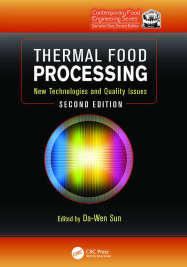Thermal Food Processing New Technologies and Quality Issues
Material type: TextLanguage: English Series: Contemporary Food Engineering SeriesPublication details: Boca Raton, FL : CRC Press, c2016Edition: 2ndDescription: XIX, 666 p. : illISBN:
TextLanguage: English Series: Contemporary Food Engineering SeriesPublication details: Boca Raton, FL : CRC Press, c2016Edition: 2ndDescription: XIX, 666 p. : illISBN: - 9781138199637
- 664.028 SUN
| Item type | Current library | Shelving location | Call number | Copy number | Status | Date due | Barcode |
|---|---|---|---|---|---|---|---|
 Reference Collection
Reference Collection
|
Periodical Section | Department of Food Engineering | 664.028 SUN | 2022-23 | Available | 97926 |
Biography
Professor Da-Wen Sun is a world authority in food engineering research and education. He is a Member of Royal Irish Academy—the highest academic honor in Ireland, and is also a member of Academia Europaea (The Academy of Europe). His main research activities include cooling, drying, and refrigeration processes and systems; quality and safety of food products; bioprocess simulation and optimization; and computer vision technology. His many scholarly works have become standard reference materials for researchers in the areas of computer vision, computational fluid dynamics modelling, vacuum cooling, and other areas.
SUMMARY:
Thermal processing remains one of the most important processes in the food industry. Now in its second edition, Thermal Food Processing: New Technologies and Quality Issues continues to explore the latest developments in the field. Assembling the work of a worldwide panel of experts, this volume highlights topics vital to the food industry today and pinpoints the trends in future research and development.
Topics discussed include:
Thermal properties of foods, including heat capacity, conductivity, diffusivity, and density
Heat and mass transfer and related engineering principles, mechanisms, and models
The development and application of deterministic heat transfer models for predicting internal product temperatures
Modeling thermal processing using artificial neural networks (ANN) and computational fluid dynamics (CFD)
Thermal processing of meat, poultry, fish, and dairy products; canned foods; ready meals; and vegetables
The effect of ultrahigh temperature (UHT) treatment processing on milk, including the impact on nutrient composition, safety, and organoleptic aspects
Ohmic, radio frequency (RF) dialectric, infrared, and pressure-assisted heating
pH-assisted thermal processing
In addition to updating all content, this second edition includes five new chapters: Thermal Effects in Food Microbiology, Modeling Thermal Microbial Inactivation Kinetics, Thermal Processing of Food and Fruit Juices, Aseptic Processing and Packaging, and Microwave Heating. The final chapter of the book examines systems used in the evaluation of thermal processes and the development of time temperature integrators (TTIs) to ensure the safety of thermally processed food. An up-to-date survey of essential techniques and the science behind them, this volume is a critical reference for food industry professionals.
